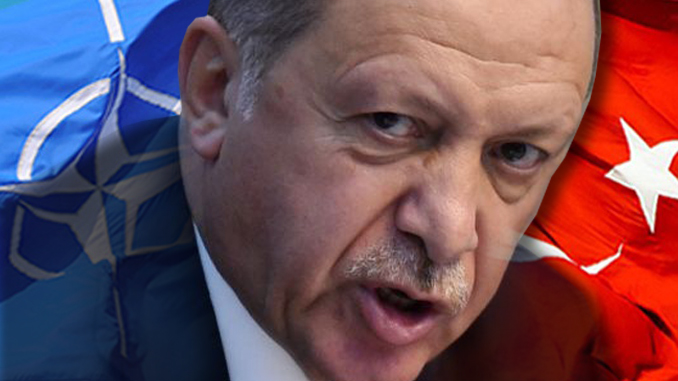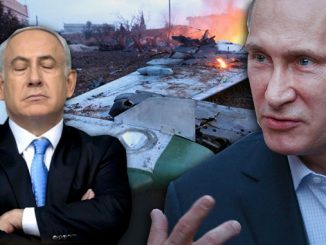
If Turkish president Erdogan has his way, the U.S. will be drawn into conflict with Russia.
By Phil Giraldi
Domestic politics in the United States—with the White House lashing out against enemies and a Democratic Party trying to find itself—have been more or less “disappearing” the foreign news. In one important report, however, the Trump administration is to be commended for finally taking steps to end the Afghanistan war, but any actual U.S. withdrawal will depend on a lot of “what ifs” falling into place before the nearly 19-year-old conflict can be declared over. There is already resistance to a prisoner exchange being expressed on the part of the current regime in Kabul and the timetable for actual withdrawal will depend on compliance by all parties, which is by no means guaranteed.
In Afghanistan the United States struggled to bring liberal democracy to what was essentially a failed state, sending in a musical chairs assortment of generals to protect inept proconsuls who had no plan or end game. The eventual result will be a Taliban-run country, as Pashtuns constitute a clear majority of the population, and direct American military and economic involvement will no doubt be replaced by Chinese economic imperialism. But there is no good reason for the U.S. and its NATO allies to remain in Kabul while there are plenty of good reasons to get out. The most notable reason is that the “war” is unwinnable in any real sense.
Meanwhile, one conflict that threatens to blow up into something much larger is bubbling away in northern Syria, where the Syrian Arab Army is confronting rebel groups in Idlib Province as well as Turkish militias and increasingly Turkish army units. Russia has become involved in the fighting on behalf of its Syrian ally, primarily using its superiority in the air to support advances by regular army units with Turkish casualties the result.
On Feb. 27, airstrikes, believed to have been carried out by Russia, killed 36 Turkish soldiers and wounded 30 more in northwest Syria where the fighting has been most intense. The dead soldiers were part of a resupply column and also manning observation posts near the city of Idlib. Thousands of demonstrators in Istanbul and Ankara marched demanding justice for the “Russian murderers” and the “Murderer Putin.” Turkish President Recep Tayyip Erdogan responded to the crisis by speaking with his counterpart President Vladimir Putin of Russia on the phone. He carefully did not accuse Russia directly of the attacks but indicated that Turkey would be retaliating with strikes of its own to counter the Russian-supported Syrian army advance. Both the Russians and Turks have been debating the terms of a 2018 de-escalation agreement, which was made expressly to avoid armed conflict between Ankara and Moscow. Outside observers believe that the fighting in and around Idlib has been fluid and confusing, with actual battlefronts and targets difficult to discern.
Erdogan has often maintained that border areas in northern Syria inhabited by large numbers of Turkomans are historically part of Turkey and were stolen by the French and British to form Syria through the 1921 Treaty of Sykes-Picot that created the map of today’s Middle East. Erdogan has also demanded that there be a monitored weapons-free border zone where Turkey and Syria share a border to inhibit the activity of the Kurdish Kurdistan Workers’ Party (PKK) terrorist group.
Though Erdogan tends to be both impetuous and bull-headed, he is sensitive to the fact that Turkish opinion is against further involvement in Syria. There is also considerable resentment over the nearly 4 million displaced Syrian refugees that are living in Turkey. Over the weekend, Erdogan responded to popular pressure to do something about the refugees. He opened the border with Greece, in effect sending the Syrian problem again into Europe, while demanding that the Europeans do something to help him in his fight against Damascus.
The United States for its part has been sending mixed messages. President Donald Trump has had an on-again-off-again relationship with Erdogan, and he has more or less approved the Turkish presence in the border areas. Though it seems that at least for the moment the danger of a major armed conflict between Russia and Turkey has diminished, many believe that more incidents are likely and could easily escalate.
Now for the truly dangerous part. Turkey and the United States are members of NATO. Under Article 5 of the NATO treaty, an attack on any one member is considered to be the same as an attack on all members. Thus, all members must respond by coming to the defense of the victim of the attack. There are reports from Washington that Turkey has asked the United States for Patriot missiles to defend its troops on the ground in Syria. It has also called for NATO to enforce a no-fly zone in Idlib Province, air space that is currently controlled by Russia. Omer Celik, speaking for Erdogan’s Justice and Development Party, said that in his government’s view, “The attack against Turkey is an attack against NATO. NATO should have been with Turkey, not starting today but from before these events.” Washington, for its part, has indicated that it will not budge on the Patriots until Turkey disables the S-400 antiaircraft missile system that it has purchased from Russia. NATO has not decided on the request for a no-fly commitment, presumably because it understands that intervening on behalf of Turkey would mean war with Russia.
Under normal circumstances and in a normal world, the very idea that a member of a defensive alliance should be able to attack another country, as Turkey has done in Syria, and then demand assistance from other members of the alliance when the attacked country fights back would be a nonstarter. But the problem with that kind of rational thinking is that NATO has long since ceased to be a defensive alliance. Both as an alliance and also acting through several of its member states, it has been actively involved in wars that have nothing to do with the defense of Europe or of the Atlantic relationship with Washington. NATO troops are currently in Afghanistan and have also been in Iraq, Syria, and Libya. Alliance members including the U.S. fought in Bosnia and Kosovo.
And there are the usual head cases on the American side also demanding action. Sen. Marco Rubio of Florida tweeted, “The prospects of a direct military confrontation between Turkey and Russia in Syria are very high and increasing by the hour. [Erdogan] is on the right side here. Putin and Assad are responsible for this horrific humanitarian catastrophe.”
U.S. ambassador to NATO Kay Bailey Hutchison told reporters, “This is a big development, and our alliance is with Turkey. It is not with Russia. We want Turkey to understand that we are the ones that they’ve been allied with.”
Some observers are pondering whether Turkey will actually declare war on Syria, which would certainly complicate things for both NATO and Washington. The outcome of such a conflict, pitting NATO’s second largest army against the battered Syrian Arab Army, would certainly be defeat for Damascus, but it would solve nothing. If the United States were to get drawn into the conflict due to its NATO tie, it would be yet another major misstep coming on the heels of Afghanistan and Iraq, binding Americans to policies that serve no conceivable national interest while also impoverishing the nation still further and killing its young men and women needlessly. NATO no longer serves any useful purpose, and if it turns out to be a tie that binds the U.S. to bad policies, it is past time to terminate the alliance.
Philip Giraldi is a former CIA counter-terrorism specialist and military intelligence officer and a columnist and television commentator. He is also the executive director of the Council for the National Interest. His other articles appear on the website of “The Unz Review.”







